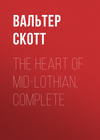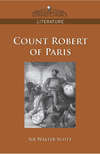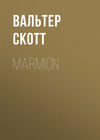Read the book: «Waverley; Or 'Tis Sixty Years Since — Complete», page 23
'Fear not,' said Lord Boteler, 'he shall be found, if this or the four adjacent counties hold him. And now Lord Fitzosborne will be pleased to doff the armour he has so kindly assumed for our sakes, and we will all bowne ourselves for the banquet.'
When the hour of dinner approached, the Lady Matilda and her cousin visited the chamber of the fair Darcy. They found her in a composed but melancholy postmire. She turned the discourse upon the misfortunes of her life, and hinted, that having recovered her brother, and seeing him look forward to the society of one who would amply repay to him the loss of hers, she had thoughts of dedicating her remaining life to Heaven, by whose providential interference it had been so often preserved.
Matilda coloured deeply at something in this speech, and her cousin inveighed loudly against Emma's resolution. 'Ah, my dear lady Eleanor,' replied she, 'I have to-day witnessed what I cannot but judge a supernatural visitation, and to what end can it call me but to give myself to the altar? That peasant who guided me to Baddow through the Park of Danbury, the same who appeared before me at different times and in different forms during that eventful journey—that youth, whose features are imprinted on my memory, is the very individual forester who this day rescued us in the forest. I cannot be mistaken; and, connecting these marvellous appearances with the spectre which I saw while at Gay Bowers, I cannot resist the conviction that Heaven has permitted my guardian angel to assume mortal shape for my relief and protection.'
The fair cousins, after exchanging looks which implied a fear that her mind was wandering, answered her in soothing terms, and finally prevailed upon her to accompany them to the banqueting-hall. Here the first person they encountered was the Baron Fitzosborne of Diggswell, now divested of his armour, at the sight of whom the Lady Emma changed colour, and exclaiming, 'It is the same!' sunk senseless into the arms of Matilda.
'She is bewildered by the terrors of the day,' said Eleanor;' and we have done ill in obliging her to descend.'
'And I,'said Fitzosborne, 'have done madly in presenting before her one whose presence must recall moments the most alarming in her life.'
While the ladies supported Emma from the hall, Lord Boteler and Saint Clere requested an explanation from Fitzosborne of the words he had used.
'Trust me, gentle lords,' said the Baron of Diggswell, 'ye shall have what ye demand when I learn that Lady Emma Darcy has not suffered from my imprudence.'
At this moment Lady Matilda, returning, said that her fair friend, on her recovery, had calmly and deliberately insisted that she had seen Fitzosborne before, in the most dangerous crisis of her life.
'I dread,' said she, 'her disordered mind connects all that her eye beholds with the terrible passages that she has witnessed.'
'Nay,' said Fitzosborne, 'if noble Saint Clere can pardon the unauthorized interest which, with the purest and most honourable intentions, I have taken in his sister's fate, it is easy for me to explain this mysterious impression.'
He proceeded to say that, happening to be in the hostelry called the Griffin, near Baddow, while upon a journey in that country, he had met with the old nurse of the Lady Emma Darcy, who, being just expelled from Gay Bowers, was in the height of her grief and indignation, and made loud and public proclamation of Lady Emma's wrongs. From the description she gave of the beauty of her foster-child, as well as from the spirit of chivalry, Fitzosborne became interested in her fate. This interest was deeply enhanced when, by a bribe to old Gaunt the Reve, he procured a view of the Lady Emma as she walked near the castle of Gay Bowers. The aged churl refused to give him access to the castle; yet dropped some hints as if he thought the lady in danger, and wished she were well out of it. His master, he said, had heard she had a brother in life, and since that deprived him of all chance of gaining her domains by purchase, he—in short, Gaunt wished they were safely separated. 'If any injury,' quoth he, 'should happen to the damsel here, it were ill for us all. I tried by an innocent stratagem to frighten her from the castle, by introducing a figure through a trap-door, and warning her, as if by a voice from the dead, to retreat from thence; but the giglet is wilful, and is running upon her fate.'
Finding Gaunt, although covetous and communicative, too faithful a servant to his wicked master to take any active steps against his commands, Fitzosborne applied himself to old Ursely, whom he found more tractable. Through her he learned the dreadful plot Gaston had laid to rid himself of his kinswoman, and resolved to effect her deliverance. But aware of the delicacy of Emma's situation, he charged Ursely to conceal from her the interest he took in her distress, resolving to watch over her in disguise until he saw her in a place of safety. Hence the appearance he made before her in various dresses during her journey, in the course of which he was never far distant; and he had always four stout yeomen within hearing of his bugle, had assistance been necessary. When she was placed in safety at the lodge, it was Fitzosborne's intention to have prevailed upon his sisters to visit and take her under their protection; but he found them absent from Diggswell, having gone to attend an aged relation who lay dangerously ill in a distant county. They did not return until the day before the May-games; and the other events followed too rapidly to permit Fitzosborne to lay any plan for introducing them to Lady Emma Darcy. On the day of the chase he resolved to preserve his romantic disguise, and attend the Lady Emma as a forester, partly to have the pleasure of being near her and partly to judge whether, according to an idle report in the country, she favoured his friend and comrade Fitzallen of Marden. This last motive, it may easily be believed, he did not declare to the company. After the skirmish with the ruffians, he waited till the Baron and the hunters arrived, and then, still doubting the farther designs of Gaston, hastened to his castle to arm the band which had escorted them to Queenhoo-Hall.
Fitzosborne's story being finished, he received the thanks of all the company, particularly of Saint Clere, who felt deeply the respectful delicacy with which he had conducted himself towards his sister. The lady was carefully informed of her obligations to him; and it is left to the well-judging reader whether even the raillery of Lady Eleanor made her regret that Heaven had only employed natural means for her security, and that the guardian angel was converted into a handsome, gallant, and enamoured knight.
The joy of the company in the hall extended itself to the buttery, where Gregory the jester narrated such feats of arms done by himself in the fray of the morning as might have shamed Bevis and Guy of Warwick. He was, according to his narrative, singled out for destruction by the gigantic Baron himself, while he abandoned to meaner hands the destruction of Saint Clere and Fitzosborne.
'But certes,' said he, 'the foul paynim met his match; for, ever as he foined at me with his brand, I parried his blows with my bauble, and, closing with him upon the third veny, threw him to the ground, and made him cry recreant to an unarmed man.'
'Tush, man,' said Drawslot, 'thou forgettest thy best auxiliaries, the good greyhounds, Help and Holdfast! I warrant thee, that when the hump-backed Baron caught thee by the cowl, which he hath almost torn off, thou hadst been in a fair plight had they not remembered an old friend, and come in to the rescue. Why, man, I found them fastened on him myself; and there was odd staving and stickling to make them "ware haunch!" Their mouths were full of the flex, for I pulled a piece of the garment from their jaws. I warrant thee, that when they brought him to ground thou fledst like a frighted pricket.'
'And as for Gregory's gigantic paynim,' said Fabian, 'why, he lies yonder in the guard-room, the very size, shape, and colour of a spider in a yew-hedge.'
'It is false!' said Gregory. 'Colbrand the Dane was a dwarf to him.'
'It is as true,' returned Fabian, 'as that the Tasker is to be married on Tuesday to pretty Margery. Gregory, thy sheet hath brought them between a pair of blankets.'
'I care no more for such a gillflirt,' said the jester,' than I do for thy leasings. Marry, thou hop-o'-my-thumb, happy wouldst thou be could thy head reach the captive Baron's girdle.'
'By the mass,' said Peter Lanaret, 'I will have one peep at this burly gallant'; and, leaving the buttery, he went to the guard-room where Gaston Saint Clere was confined. A man-at-arms, who kept sentinel on the strong studded door of the apartment, said he believed he slept; for that, after raging, stamping, and uttering the most horrid imprecations, he had been of late perfectly still. The falconer gently drew back a sliding board of a foot square towards the top of the door, which covered a hole of the same size, strongly latticed, through which the warder, without opening the door, could look in upon his prisoner. From this aperture he beheld the wretched Gaston suspended by the neck by his own girdle to an iron ring in the side of his prison. He had clambered to it by means of the table on which his food had been placed; and, in the agonies of shame and disappointed malice, had adopted this mode of ridding himself of a wretched life. He was found yet warm, but totally lifeless. A proper account of the manner of his death was drawn up and certified. He was buried that evening in the chapel of the castle, out of respect to his high birth; and the chaplain of Fitzallen of Marden, who said the service upon the occasion, preached the next Sunday an excellent sermon upon the text, 'Radix malorum est cupiditas,' which we have here transcribed.
Here the manuscript, from which we have painfully transcribed, and frequently, as it were, translated, this tale for the reader's edification, is so indistinct and defaced, that, excepting certain howbeits, nathlesses, lo ye's! etc., we can pick out little that is intelligible, saving that avarice is defined 'a likourishness of heart after earthly things.' A little farther there seems to have been a gay account of Margery's wedding with Ralph the Tasker, the running at the quintain, and other rural games practised on the occasion. There are also fragments of a mock sermon preached by Gregory upon that occasion, as for example:—
'My dear cursed caitiffs, there was once a king, and he wedded a young old queen, and she had a child; and this child was sent to Solomon the Sage, praying he would give it the same blessing which he got from the witch of Endor when she bit him by the heel. Hereof speaks the worthy Doctor Radigundus Potator; why should not mass be said for all the roasted shoe souls served up in the king's dish on Saturday; for true it is, that Saint Peter asked Father Adam, as they journeyed to Camelot, an high, great, and doubtful question, "Adam, Adam, why eated'st thou the apple without paring?"
[Footnote: This tirade of gibberish is literally taken or selected from a mock discourse pronounced by a professed jester, which occurs in an ancient manuscript in the Advocates' Library, the same from which the late ingenious Mr. Weber published the curious comic romance of the Hunting of the Hare. It was introduced in compliance with Mr Strutt's plan of rendering his tale an illustration of ancient manners A similar burlesque sermon is pronounced by the fool in Sir David Lindesay's satire of the Three Estates. The nonsense and vulgar burlesque of that composition illustrate the ground of Sir Andrew Aguecheek's eulogy on the exploits of the jester in Twelfth Night, who, reserving his sharper jests for Sir Toby, had doubtless enough of the jargon of his calling to captivate the imbecility of his brother knight, who is made to exclaim—'In sooth, thou wast in very gracious fooling last night, when thou spokest of Pigrogremitus, and of the vapours passing the equinoctials of Quenbus; 't was very good, i' faith!' It is entertaining to find commentators seeking to discover some meaning in the professional jargon of such a passage as this.]
With much goodly gibberish to the same effect; which display of Gregory's ready wit not only threw the whole company into convulsions of laughter, but made such an impression on Rose, the Potter's daughter, that it was thought it would be the Jester's own fault if Jack was long without his Jill. Much pithy matter, concerning the bringing the bride to bed, the loosing the bridegroom's points, the scramble which ensued for them, and the casting of the stocking, is also omitted from its obscurity.
The following song which has been since borrowed by the worshipful author of the famous History of Fryar Bacon, has been with difficulty deciphered. It seems to have been sung on occasion of carrying home the bride
Bridal Song
To the tune of—'I have been a Fiddler,' etc,
And did you not hear of a mirth befell
The morrow after a wedding day,
And carrying a bride at home to dwell?
And away to Tewin, away, away!
The quintain was set, and the garlands were made,
'T is pity old customs should ever decay;
And woe be to him that was horsed on a jade,
For he carried no credit away, away.
We met a consort of fiddle-de-dees;
We set them a cockhorse, and made them play
The winning of Bullen and Upsey-frees,
And away to Tewin, away, away!
There was ne'er a lad in all the parish
That would go to the plough that day;
But on his fore-horse his wench he carries.
And away to Tewin, away, away!
The butler was quick, and the ale he did tap,
The maidens did make the chamber full gay;
The servants did give me a fuddling cup,
And I did carry't away, away.
The smith of the town his liquor so took,
That he was persuaded that the ground look'd blue;
And I dare boldly be sworn on a book,
Such smiths as he there's but a few.
A posset was made, and the women did sip,
And simpering said, they could eat no more;
Full many a maiden was laid on the lip,—
I'll say no more, but give o'er (give o'er).
But what our fair readers will chiefly regret is the loss of three declarations of love; the first by Saint Clere to Matilda; which, with the lady's answer, occupies fifteen closely written pages of manuscript. That of Fitzosborne to Emma is not much shorter; but the amours of Fitzallen and Eleanor, being of a less romantic cast, are closed in three pages only. The three noble couples were married in Queenhoo-Hall upon the same day, being the twentieth Sunday after Easter. There is a prolix account of the marriage-feast, of which we can pick out the names of a few dishes, such as peterel, crane, sturgeon, swan, etc. etc., with a profusion of wild-fowl and venison. We also see that a suitable song was produced by Peretto on the occasion; and that the bishop who blessed the bridal beds which received the happy couples was no niggard of his holy water, bestowing half a gallon upon each of the couches. We regret we cannot give these curiosities to the reader in detail, but we hope to expose the manuscript to abler antiquaries so soon as it shall be framed and glazed by the ingenious artist who rendered that service to Mr. Ireland's Shakspeare MSS. And so (being unable to lay aside the style to which our pen is habituated), gentle reader, we bid thee heartily farewell.
NO. III
ANECDOTE OF SCHOOL DAYS
UPON WHICH MR. THOMAS SCOTT PROPOSED TO FOUND A TALE OF FICTION
It is well known in the South that there is little or no boxing at the Scottish schools. About forty or fifty years ago, however, a far more dangerous mode of fighting, in parties or factions, was permitted in the streets of Edinburgh, to the great disgrace of the police and danger of the parties concerned. These parties were generally formed from the quarters of the town in which the combatants resided, those of a particular square or district fighting against those of an adjoining one. Hence it happened that the children of the higher classes were often pitted against those of the lower, each taking their side according to the residence of their friends. So far as I recollect, however, it was unmingled either with feelings of democracy or aristocracy, or indeed with malice or ill-will of any kind towards the opposite party. In fact, it was only a rough mode of play. Such contests were, however, maintained with great vigour with stones and sticks and fisticuffs, when one party dared to charge and the other stood their ground. Of course mischief sometimes happened; boys are said to have been killed at these bickers, as they were called, and serious accidents certainly took place, as many contemporaries can bear witness.
The author's father residing in George Square, in the southern side of Edinburgh, the boys belonging to that family, with others in the square, were arranged into a sort of company, to which a lady of distinction presented a handsome set of colours. Now this company or regiment, as a matter of course, was engaged in weekly warfare with the boys inhabiting the Crosscauseway, Bristo Street, the Potterrow—in short, the neighbouring suburbs. These last were chiefly of the lower rank, but hardy loons, who threw stones to a hair's-breadth and were very rugged antagonists at close quarters. The skirmish sometimes lasted for a whole evening, until one party or the other was victorious, when, if ours were successful, we drove the enemy to their quarters, and were usually chased back by the reinforcement of bigger lads who came to their assistance. If, on the contrary, we were pursued, as was often the case, into the precincts of our square, we were in our turn supported by our elder brothers, domestic servants, and similar auxiliaries.
It followed, from our frequent opposition to each other, that, though not knowing the names of our enemies, we were yet well acquainted with their appearance, and had nicknames for the most remarkable of them. One very active and spirited boy might be considered as the principal leader in the cohort of the suburbs. He was, I suppose, thirteen or fourteen years old, finely made, tall, blue-eyed, with long fair hair, the very picture of a youthful Goth. This lad was always first in the charge and last in the retreat—the Achilles, at once, and Ajax of the Crosscauseway. He was too formidable to us not to have a cognomen, and, like that of a knight of old, it was taken from the most remarkable part of his dress, being a pair of old green livery breeches, which was the principal part of his clothing; for, like Pentapolin, according to Don Quixote's account, Green-Breeks, as we called him, always entered the battle with bare arms, legs, and feet.
It fell, that once upon a time, when the combat was at the thickest, this plebeian champion headed a sudden charge, so rapid and furious that all fled before him. He was several paces before his comrades, and had actually laid his hands on the patrician standard, when one of our party, whom some misjudging friend had entrusted with a couleau de chasse, or hanger, inspired with a zeal for the honour of the corps worthy of Major Sturgeon himself, struck poor Green-Breeks over the head with strength sufficient to cut him down. When this was seen, the casualty was so far beyond what had ever taken place before, that both parties fled different ways, leaving poor Green-Breeks, with his bright hair plentifully dabbled in blood, to the care of the watchman, who (honest man) took care not to know who had done the mischief. The bloody hanger was flung into one of the Meadow ditches, and solemn secrecy was sworn on all hands; but the remorse and terror of the actor were beyond all bounds, and his apprehensions of the most dreadful character. The wounded hero was for a few days in the Infirmary, the case being only a trifling one. But, though inquiry was strongly pressed on him, no argument could make him indicate the person from whom he had received the wound, though he must have been perfectly well known to him. When he recovered and was dismissed, the author and his brothers opened a communication with him, through the medium of a popular ginger-bread baker, of whom both parties were customers, in order to tender a subsidy in name of smart-money. The sum would excite ridicule were I to name it; but sure I am that the pockets of the noted Green-Breeks never held as much money of his own. He declined the remittance, saying that he would not sell his blood; but at the same time reprobated the idea of being an informer, which he said was clam, i.e. base or mean. With much urgency he accepted a pound of snuff for the use of some old woman—aunt, grandmother, or the like—with whom he lived. We did not become friends, for the bickers were more agreeable to both parties than any more pacific amusement; but we conducted them ever after under mutual assurances of the highest consideration for each other.
Such was the hero whom Mr. Thomas Scott proposed to carry to Canada, and involve in adventures with the natives and colonists of that country. Perhaps the youthful generosity of the lad will not seem so great in the eyes of others as to those whom it was the means of screening from severe rebuke and punishment. But it seemed to those concerned to argue a nobleness of sentiment far beyond the pitch of most minds; and however obscurely the lad who showed such a frame of noble spirit may have lived or died, I cannot help being of opinion that, if fortune had placed him in circumstances calling for gallantry or generosity, the man would have fulfilled the promise of the boy. Long afterwards, when the story was told to my father, he censured us severely for not telling the truth at the time, that he might have attempted to be of use to the young man in entering on life. But our alarms for the consequences of the drawn sword, and the wound inflicted with such a weapon, were far too predominant at the time for such a pitch of generosity.
Perhaps I ought not to have inserted this schoolboy tale; but, besides the strong impression made by the incident at the time, the whole accompaniments of the story are matters to me of solemn and sad recollection. Of all the little band who were concerned in those juvenile sports or brawls, I can scarce recollect a single survivor. Some left the ranks of mimic war to die in the active service of their country. Many sought distant lands to return no more. Others, dispersed in different paths of life,'my dim eyes now seek for in vain.' Of five brothers, all healthy and promising in a degree far beyond one whose infancy was visited by personal infirmity, and whose health after this period seemed long very precarious, I am, nevertheless, the only survivor. The best loved, and the best deserving to be loved, who had destined this incident to be the foundation of literary composition, died 'before his day' in a distant and foreign land; and trifles assume an importance not their own when connected with those who have been loved and lost.



















